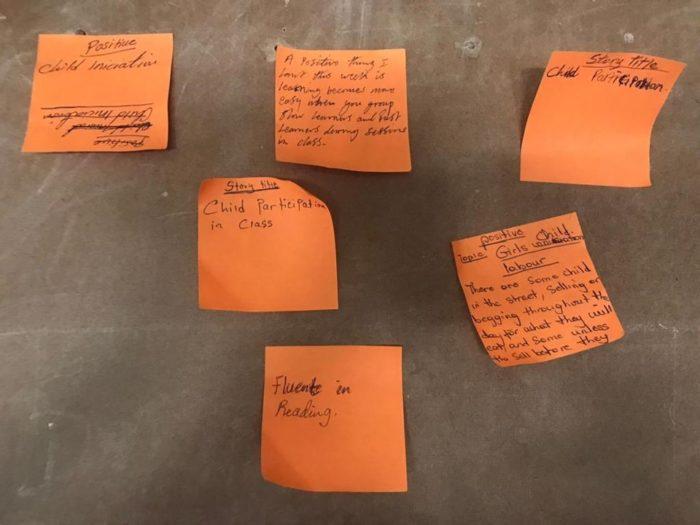In the context of a numeracy programme (in sub-Saharan Africa) we had a conversation a few days ago, that reminded me of the videos that we produced for OER4Schools, now almost 10 years ago. We recently migrated the OER4Schools wiki, and it’s available here https://oer.opendeved.net. We’re still working on it, so it’s not perfect, but getting there.
Continue reading “Our maths videos for teachers”Tich Mi Ar Tich Dem
Over the past two decades, Sierra Leone has faced a series of shocks: a civil war, landslides, Ebola, and the COVID-19 pandemic. These shocks have aggravated the learning crisis that the country’s education system faces—and dramatically increased the pressure on teachers to deliver high-quality support to children.
In this context, the Ministry of Basic and Senior Secondary Education and the Teaching Service Commission have come together to design a low-cost and scalable initiative to support the professional development of the education workforce. The initiative is school-based, technology-supported, and focused on early grade literacy and numeracy.
With funding from Dubai Cares, we have started to support the Government of Sierra Leone to build evidence to inform the development of the model under the Tich Mi Ar Tich Dem—’teach me to teach them’— programme.
Continue reading “Tich Mi Ar Tich Dem”TVET Research in SUB-SAHARAN AFRICA — New Report
We are pleased to announce that a new report detailing the state of research on Technical and Vocational Education and Training (TVET) in Sub-Saharan Africa is now available in our evidence library. The report was commissioned by the Federal Ministry of Education and Research (BMBF) in collaboration with GOVET (the German Office for International Cooperation in Vocational Education and Training) and is an expanded and revised version of an earlier report, published in 2019 in German.
The report provides an in-depth overview of the research on TVET in Sub-Saharan Africa, with a view to identifying gaps in the research and provide the impetus for further research and the formation of international research networks in TVET in the region. The report is aimed at researchers and practitioners from technical and vocational education and training and related disciplines who are performing research in or about Sub-Saharan Africa (SSA), as well as interested members of the general public.
The 200-page report contains 16 chapters. The report is available as a single PDF; however, each chapter is also available separately (including a chapter bibliography) for ease of access and reuse. The report begins with an executive summary, follows by these chapters:
- Chapter 1 contains the introduction.
- Chapter 2 presents the research design (methodological approach) of the report, including the research questions.
- Chapter 3 offers an overview of the quality and relevance of the publications found on TVET.
- Chapter 4 deals with the conception and practice of TVET.
- Chapter 5 examines the various stakeholders in TVET research and their networks, e.g. the institutions that are involved in TVET and TVET research (e.g. faculties at universities as well as non-university and non-state colleges).
- Chapter 6 deals with topics, perspectives and current debates of TVET research in SSA.
- Chapter 7 carries out a systematic review of the studies on TVET in SSA, i.e., it examines reliable statements made about TVET in relevant research publications.
- Chapter 8 examines models for the design, development, and delivery of TVET
- Chapter 9 looks at gender issues in TVET in SSA, as well as inclusion challenges and strategies.
- Chapter 10 looks at key state actors in TVET (state authorities and key policies) for four countries: Botswana, Ghana, Kenya, and Nigeria. These countries reflect a diverse variety of TVET system structures.
- Chapter 11 examines the importance of non-governmental actors in TVET from a range of countries where information was available, including Ethiopia, Botswana, Ghana, Kenya, Nigeria, Uganda, and Tanzania.
- Chapter 12 looks at national standards, guidelines and quality frameworks in TVET in SSA. The authors examine the role that politics, trade unions and other interest groups play in TVET.
- Chapter 13 focuses on the challenges that arise when implementing guidelines and political decisions.
- Chapter 14 focuses on how institutional framework conditions can be influenced to increase research capacity and performance. It also explores what the research interests and motivations of TVET researchers are in SSA, alongside the current and emerging TVET topics in the region.
- Chapter 15 examines networks for research into TVET. The chapter explores the networks and networking opportunities that are present across and beyond SSA and considers how those could be strengthened.
- Chapter 16 contains a summary and — based on this — some considerations of possible future developments regarding TVET and TVET research.
A number of appendices present additional information, such as an annotated bibliography, the full bibliography for the report, the methodology for the interviews and structured community review, and the results of the structured community review, as well as a list of additional materials for the report.
Access the report here:https://docs.opendeved.net/lib/ZEDIHF57
Access the chapters here: https://docs.opendeved.net/lib/?featured=7B4X227X.KLHQM77T&sort=date_desc
Access the German version of the report here: https://lit.bibb.de/vufind/Record/DS-184013
Helping you find and compare EdTech tools
This blog post is a cross-post from EdTech Hub‘s blog https://edtechhub.org/2020/06/09/helping-you-find-and-compare-edtech-tools/ (Creative Commons Attribution 4.0). The blog post was written on the 9th of June 2020.
We’re excited to publish the first version of a tool to help you find and compare EdTech tools.
Continue reading “Helping you find and compare EdTech tools”An inclusive approach to searching for evidence on EdTech in low- and middle-income countries
This blog post is a cross-post from EdTech Hub‘s blog https://edtechhub.org/2020/02/18/an-inclusive-approach-to-searching-for-evidence-on-edtech-in-low-and-middle-income-countries/ (Creative Commons Attribution 4.0). The blog post was written by Meaghan Brugha and Katy Jordan on the 18th of February 2020.
A searchable database
The EdTech Hub has undertaken a large-scale search for publications on technology use in education in low- and middle- income countries. During this process, we created an internal research database. This is searchable through the use of a variety of filters, such as country or intervention of focus. Analysis of the database helps us to ground our wider research, innovation and engagement activities as a Hub within the scope and quality of the evidence base.
Continue reading “An inclusive approach to searching for evidence on EdTech in low- and middle-income countries”15 EdTech research papers that we share all the time
This blog post is a cross-post from EdTech Hub‘s blog https://edtechhub.org/2020/01/24/15-edtech-research-papers-that-we-share-all-the-time/ (Creative Commons Attribution 4.0). The blog post was written by Caitlin Moss on the 24th of January 2020.
We hope you saw our recent blog post responding to questions we often get about interesting large-scale EdTech initiatives. Another question we are often asked is: “What EdTech research should I know about?”
As Sara’s blog post explains, one of the Hub’s core spheres of work is research, so we ourselves are very interested in the answer to this question. Katy’s latest blog post explains how the Hub’s research programme is addressing this question through a literature review to create a foundation for further research. While the literature review is in progress, we thought we would share an initial list of EdTech papers that we often reach for. At the Hub we are fortunate enough to have authors of several papers on this list as members of our team.
Continue reading “15 EdTech research papers that we share all the time”

